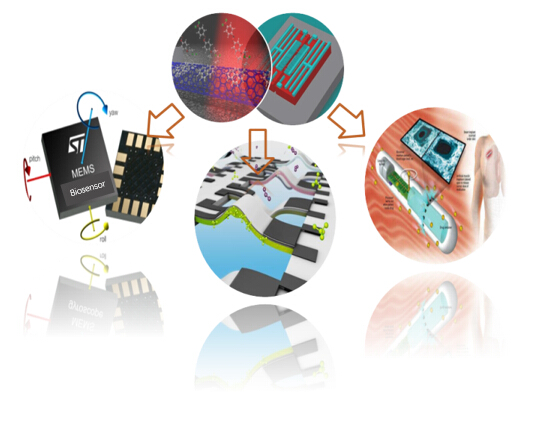Course
Advances in Micro/Nano Biochemical Sensors (微纳生化传感器前沿进展)

Course Objectives
- In-depth analysis of the operating principle of modern biosensors;
- Physical chemistry at the sensor interface;
- How Micro/nano technology to improve the performance of the biosensors (sensitivity, selectivity etc.);
- Micro/nano sensor fabrications and fluid integrations;
- Current limitations and challenges.
Students of this course will not only learn how to fabricate a biosensor, but will be able to decide what sensor to make, appreciate their design principles, interpret measured results, and spot emerging research trends.
Who Should Take the Course?
Engineers, chemists, physicists, biologist, and biomedical student who have an interest in the emerging field of micro/nano biochemical sensors.
Prerequisites
Graduate students in precise instrument, electrical engineering, physics, chemistry, and biology.
Basic English communication skills are required.
Course Outline
CP 1: Introduction to Micro/Nano biosensors (2)
• L1.1: What are biosensors, why Micro & Nano?
• L1.2: Biosensor history and current status
• L1.3: Classical Sensors
CP 2: Basic chemistry in biosensors (4)
• L2.1: Biomolecules, Protein, DNA structures and their immobilizations on sensor surface
• L2.2: Thermodynamic and Kinetics at biosensor surface
CP 3: Optical biosensors (4)
• L3.1: Optical Imaging
• L3.2: Optical Sensing
• L3.3: Opto-genetics
CP 4: Electrical biosensors (4)
• L4.1: Potentiometric Sensors (FET)
• L4.2: Amperometric Sensors
• L4.3: Cyclic Voltammetry
• L4.4 Electrochemical Impedance spectroscopy
CP 5: Mechanical biosensors (2)
• L5.1: Cantilever-based Sensors
• L5.2: Acoustical sensors
CP 6: Micro/Nano Fabrications (2)
• L6.1: MEMS technology
• L6.2: Signal processing
CP 7: DNA Sensors (4)
• L7.1: DNA Hybridizations
• L7.2: DNA sequencing
CP 8: Immunosensors (4)
• L8.1: antibody- antigen
• L8.2: Single molecule detections
CP 9: Nanosensors (2)
• L9.1: Nanomaterials
• L9.2: Nanodevice
CP 10: Microfluidics (2)
• L10.1: Advances in microfluidics
• L10.2: Sensor integrations
Course Resources
• Introduction to Biosensors, Jeong-Yeol Yoon et al. Springer
• Handbook of Biosensors and Biosensor Kinetics, Ajit Sadana, Elsevier
• Nanofabrication Towards Biomedical Applications, Challa Kumar, Wiley-VCH
• Optical Biosensors: Present & Future, Frances Ligler, Elsevier